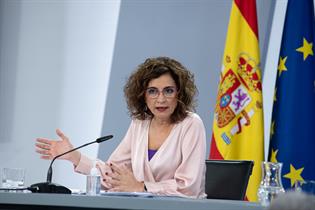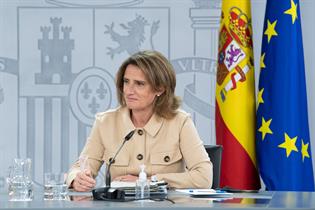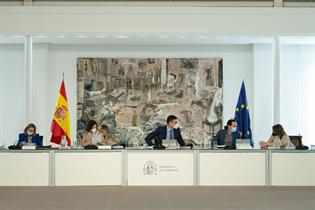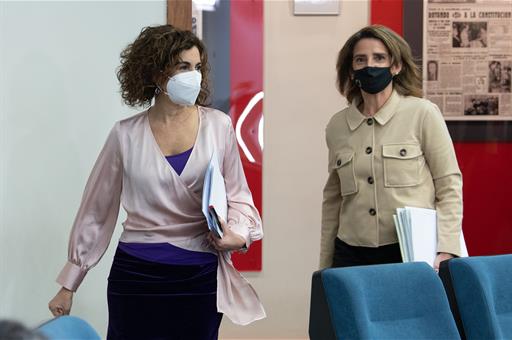Council of Ministers
Government approves reform of points-based driving licence
Council of Ministers - 2021.3.16
Moncloa Palace, Madrid
The Council of Ministers approved the submission to Parliament of the draft law that reforms the Traffic, Motor Vehicle and Road Safety Act in the part relating to the driving licence under the points system, in force since 2006.
The reform is part of the government strategy to push through a new model of road safety, in line with the European Union, which reduces by 50% the number of deaths and serious injuries over the next ten years and moves towards a figure of zero by the year 2050.
The Minister for the Treasury and Government Spokesperson, María Jesús Montero, explained that the sanctions established for conduct that creates a greater risk for driving will be toughened, such as speaking by mobile phone and misusing protection and safety elements.
 María Jesús Montero highlighted that one of the main modification to the legislation distinguishes between two types of offence in the event of using a mobile phone. When holding the phone while driving, the sanction will mean the loss of six points. When using the phone hands free, three points will be lost. Furthermore, the driver will lose four points, instead of three, if safety belts, child restraint systems, helmets and other protective elements are not used properly
María Jesús Montero highlighted that one of the main modification to the legislation distinguishes between two types of offence in the event of using a mobile phone. When holding the phone while driving, the sanction will mean the loss of six points. When using the phone hands free, three points will be lost. Furthermore, the driver will lose four points, instead of three, if safety belts, child restraint systems, helmets and other protective elements are not used properly
Other measures include the unification of the time that must elapse without committing offences to recover the initial total of 12 points in a period of two years. A prohibition is established of exceeding the speed limit by 20 kilometres per hour when overtaking. The possession of a device to detect radars will be considered an offence, incurring a loss of three points, even if it is not used.
Furthermore, the participation of drivers in safe driving courses will be promoted, which will be compensated with the recovery of between two and fifteen points.
Regulation of highway assistance services
The government also regulated the assistance services on public roads to increase the safety of these operations, which involve a high degree of danger.
María Jesús Montero specified that more than 11,000 operations of this type take place every day in which more than 60 operators have died since 2015, 113 have been admitted to hospital and 769 have been injured while rescuing or removing vehicles that have pulled over on intercity roads.
The Government Spokesperson announced that the system to signal a stationary vehicle through the use of two triangles placed in front of and behind the vehicle will be replaced by a luminous yellow device that will be placed on the highest point of the vehicle, without the need to exit the vehicle, which will become obligatory as of 1 January 2026.
This new form of signalling, added María Jesús Montero, will guarantee maximum visibility and will communicate its activation, deactivation and geo-positioning to the National Access Point on Traffic and Mobility Matters.
In addition, the new legislation creates the V-27 signal - a "virtual triangle" - that will be activated in the "on-board" system of the vehicle to warn of the presence of an imminent danger. Its incorporation in the vehicle will be voluntary.
Support for business solvency
 Foto: Pool Moncloa/Borja Puig de la BellacasaThe government authorised the Solvency Support Fund for Strategic Companies Management Council to approve the temporary public financial support operation requested by Avoris Corporación Empresarial S.A. - the company resulting from the integration of the Barceló and Globalia groups.
Foto: Pool Moncloa/Borja Puig de la BellacasaThe government authorised the Solvency Support Fund for Strategic Companies Management Council to approve the temporary public financial support operation requested by Avoris Corporación Empresarial S.A. - the company resulting from the integration of the Barceló and Globalia groups.
The Minister for the Treasury specified that the support amounts to a total of 320 million euros, which will be channelled through a shareholder loan of 163.2 million euros and an ordinary loan of 156.8 million euros.
María Jesús Montero recalled that the Solvency Support Fund is a mechanism approved by the government in July 2020 to provide temporary public support for financial companies affected by the COVID-19 pandemic that are considered strategic for the national or regional productive fabric.
International Racial Discrimination Day
The Council of Ministers approved an institutional declaration on the occasion of the International Day for the Elimination of Racial Discrimination, to be held on Sunday, 21 March.
María Jesús Montero declared that in the declaration the government acknowledges the work of civil society in this field and stresses that the policies designed to eliminate racial discrimination and the construction of a fairer and more inclusive society are a priority.
Government Plan of Measures to Combat Demographic Challenge
 Foto: Pool Moncloa/Borja Puig de la BellacasaThe Fourth Vice-President of the Government and Minister for Ecological Transition and Demographic Challenge, Teresa Ribera, appeared to explain the Plan of Measures to Combat the Demographic Challenge approved at the Government Delegate Committee for the Demographic Challenge, which met on Tuesday morning at Moncloa Palace.
Foto: Pool Moncloa/Borja Puig de la BellacasaThe Fourth Vice-President of the Government and Minister for Ecological Transition and Demographic Challenge, Teresa Ribera, appeared to explain the Plan of Measures to Combat the Demographic Challenge approved at the Government Delegate Committee for the Demographic Challenge, which met on Tuesday morning at Moncloa Palace.
This Plan contains 130 measures, which will mobilise an estimated investment of more than 10 billion euros over the period 2021-2023, associated with the Recovery, Transformation and Resilience Plan. "This is the largest effort made to date to address equal rights and opportunities in our small municipalities", claimed the Fourth Vice-President of the Government.
The four key pillars of the planned actions are the green transition, the digital transition, the elimination of gender gaps and social and territorial cohesion.
Among the measures to boost a just ecological transition that is beneficial for the rural environment, Teresa Ribera highlighted the rehabilitation programme and the rounds of proposals for energy efficiency for public and private buildings, the development of local energy communities, pilot projects for sustainable mobility and other initiatives to integrate renewable energies.
As regards digitalisation, the rollout of broadband networks and 5G services in transport corridors outside of major urban areas will be a priority, together with training programmes to foster employability in this sector. Digital tools, continued Teresa Ribera must also lead to the creation of public authorities closer to citizens, for example, with a land registry unit for the rural environment and municipal justice offices in some 6,600 municipalities.
Support plans will be designed to provide a response to the ageing population and to offer quality job opportunities through regional innovation centres for local entrepreneurship, with particular attention to young people and women, which will include specific programmes, pilot projects and special lines of financing.
The Fourth Vice-President of the Government stated that these measures pushed through by the government will only be fully effective if other tiers of government and local authorities, social and institutional actors join in the efforts. "We need everyone to participate".
In this regard, she expressed her gratitude for the receipt of 4,200 proposals since December, of which 60% came from small municipal authorities, "which clearly shows the commitment and desire to build a better future for their fellow countrymen of mayors and local authorities".
5.7 million people in municipalities of less than 5,000 inhabitants
According to the data provided by Teresa Ribera, the more than 6,800 municipalities with a population of less than 5,000 inhabitants in Spain are populated by a total of 5.7 million people. Many are located in areas under the threshold of 12.5 inhabitants per square kilometre, which are at-risk zones according to the European Union classification.
Furthermore, rural areas generate between 20% and 30% of national GDP, a percentage well below the 40% in France or the 50% in Germany. This loss of concentration of income and wealth is on top of the decline, ageing and male dominated population as the main problems of inland Spain.
Current affairs
 Foto: Pool Moncloa/Borja Puig de la BellacasaDuring her opening speech at the press briefing following the Council of Ministers, María Jesús Montero reported that the Cabinet reshuffle, following the announcement by the Second Vice-President of the Government and Minister for Social Rights and 2030 Agenda, Pablo Iglesias, to resign to stand in the elections to the Regional Government of Madrid, will not alter the agreement signed between the two formations that comprise the government. "This basically consists of not leaving anyone behind and of approving ambitious measures to combat the social and economic impact of the health crisis", she said.
Foto: Pool Moncloa/Borja Puig de la BellacasaDuring her opening speech at the press briefing following the Council of Ministers, María Jesús Montero reported that the Cabinet reshuffle, following the announcement by the Second Vice-President of the Government and Minister for Social Rights and 2030 Agenda, Pablo Iglesias, to resign to stand in the elections to the Regional Government of Madrid, will not alter the agreement signed between the two formations that comprise the government. "This basically consists of not leaving anyone behind and of approving ambitious measures to combat the social and economic impact of the health crisis", she said.
Non official translation





